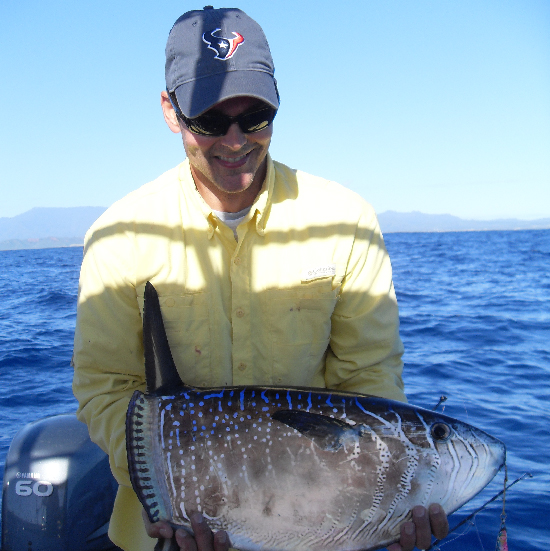M.S. Marine Science, University of Puerto Rico, 1991
B.S. Biology, Gustavus Adolphus College, 1985
Regents Professor
Department of Marine Biology

MARB 302: Introduction to Marine Biology: The Sea World Experience
MARB 425: Marine Ecology
MARB 482: Seminar in Marine Biology
Natural Resources of the Mediterranean
Biology and Geology of Coral Reefs
Advance Concepts in Marine Population Biology and Ecology (Team Taught)
Ecosystem Functions in the Marine Environment (Team Taught)
2017-2019: OAA MS/AL Sea Grant Consortium. Estimating the absolute abundance of Red Snapper in the U.S. Gulf of Mexico [PI: G. Stunz et al., Co-PIs: J. Rooker et al. $9.5 million total;
$1,379,698 to J. Rooker]
2017-2019: NOAA Saltonstall Kennedy Program. Ocean basin connectivity of Pacific bluefin tuna: linking natal origin and trans-Pacific movements into population dynamics [Co-PI: J. Rooker, $291,298 NA17NMF4270224]
2016-2019: NOAA Marine Fisheries Initiative. Life history and population structure of Snowy and Warsaw Grouper in US waters [PI: J. Rooker, $393,520, NA16NMF4330161]
2016-2018: NOAA Saltonstall Kennedy Program. Origin of yellowfin tuna in the western Atlantic Ocean: importance of outside production to US fisheries [PI: J. Rooker, $278,823 NA16NMF4270221]
2016-2017: State Wildlife Grant Program-TPWD. Temporal variability in the egress and ingress of estuarine-dependent fishes [PI: J. Rooker, $126,720]
2015-2016: NOAA Bluefin Tuna Research Program. Development of mixed-stock models for determining the origin of Bluefin Tuna [PI: J. Rooker, $116,909, NA15NMF4720107]
2016-2018: Texas OneGulf. Restoring and enhancing nursery habitats to increase fisheries production [Co:PI J. Rooker, $223,752]
2016-2018: Texas Parks and Wildlife Department. Biomass and Community Structure of Reef Fishes on TPWD Artificial Reefs [Co-PI: J. Rooker, $518,773]
2015-2018: Gulf of Mexico Research Institute. DEEPEND: Gulf of Mexico Deep-Pelagic Nekton Dynamics [PI: Tracey Sutton, Co-PIs: J. Rooker et al., TAMUG award $1,505,191, J. Rooker subcontract $742,340]
2012-2015: Louisiana Department of Wildlife and Fisheries. Nursery origin of yellowfin tuna in the Gulf of Mexico using ‘natural’ tags [PI: J. Rooker, $458,489]
2011-2013: Phases 1-3: ICCAT (Spain)/GBYP. Biological and genetic analysis of bluefin tuna-Atlantic-Wide Research Program [Consortium Proposal; Co-PI: J. Rooker €88,000 (~$120,000)]
2012-2014: NOAA Sea Grant-Texas. Movement and population connectivity of fishes across estuarine seascapes [PI: J. Rooker, $215,291 NA10OAR4170099]
2011-2014: State of Louisiana (LDWF/LSU). Impact of Deepwater Horizon incident on benthic and pelagic fish communities [Co-PI: J. Rooker, $2,937,249; J. Rooker subcontract $689,229]
NOAA-SEFSC (2011-2013). Natal origin of bluefin tuna [Co-PI: J. Rooker $154,087; J. Rooker subcontract $71,727, NA11NMF4720107]
2010-2013: McDaniel Foundation. Ocean influences on the occurrence and abundance of billfishes in the GOM [PI: J. Rooker $628,802]
2010-2011: National Science Foundation. Acquisition of instruments to facilitate and enhance education and research on marine ecosystems [PI: J. Rooker, $383,127]
2010-2011: NOAA/GMFMC (Coral Reef Conservation Program). Early life ecology of groupers on low and high diversity reefs in the northern GOM [PI: J. Rooker, $126,573, NA09NMF4410036]
2009-2010: NOAA (Cooperative Research Program). Vertical and horizontal habitat use of yellowfin tuna in the northern Gulf of Mexico [PI: J. Rooker $264,125, NA08NMF4540402]
Shane Stephens, M.S. Student
Marissa Nuttall, Ph.D. Student
Alexandra Prouse, Ph.D. Student
Emily Waddell, Ph.D. Student